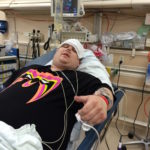
Each day, we burn through our hours with the fire of our routine. We overlook the flame; we’re not worried about the change it creates. But at the end of the day, we’re simply left watching the ashes of that change sparkle away in the wind, as we’re left holding the spent matches.
I felt the chill of that soot-laced breeze, while lying on the hood of an SUV — exactly one year ago.
On the morning of Friday, March 6, 2015, I was involved in a motorcycle accident. I was heading to the Weber State west campus to take a math test when I saw an SUV pull into my lane. I hit my brakes with only seconds to react.
My bike slid into the front end of the vehicle, shattering my leg beneath the impact. I spent the next 13 days in the hospital — sentenced with a severely broken leg.
My wife logged a daily journal of events from the beginning of my recovery. The first two entries read as follows:
March 7, 2015: “After spending the first night in the hospital, Derrick was an emotional wreck due to the pain and suffering he endured during this. We spent almost the entire day reflecting and crying. Also, he had a fever between 101-103 for the next few days, which added to him being very emotional.”
March 8, 2015: “Derrick woke up screaming after dreaming about the accident. That day we tried physical therapy, which was very hard for him.”
I knew my physical recovery was not going to be easy, but I was prepared for it. What I didn’t realize was just how bad the accident would affect me mentally. It’s easy for people to see the exterior struggles, but most don’t see how internally broken I’ve become.
Post-Traumatic Stress Disorder (PTSD) is not something reserved exclusively for military veterans. This is something I’m learning firsthand. PTSD is the haunting ghost of experience past; it continuously knocks like a broken shutter on an old window — never ceasing. The roar of a motorcycle exhaust or even the innocent glance of a left-hand turn will send my nerves into a rage.
I came home from the hospital for the first time on March 18. My family greeted me outside with a big “welcome home” sign. It felt nice to be home, but the security of the hospital was missing.
A dark realization began setting in — this was day one of a completely different life. It’s still difficult to read my wife’s writings from those first days home. She could sense my brokenness inside.
March 18, 2015: “Derrick got to come home today, but the man that came home is not the same man that he was. He was unable to get up our stairs, so he had to result to crawling, which just made him more emotional than ever.”
March 19, 2015: “Derrick did OK until about 8:00 a.m. until he went past the garage on his way upstairs, and that caused his first breakdown of the day, which continued throughout the day.”
My wife’s comfort meant everything to me. She would simply hold me, letting me cry and knowing that was all she could do. Bones can heel and scars can fade, but PTSD alters the brain, and it changed me on a human level.
I have a phenomenal support team, spearheaded by my incredibly understanding wife. In a strange way, the accident gave new life to my little family. We don’t worry about the mundane things anymore.
We live each day as though the fire will not be renewed in the morning. We scatter the ashes of each day, like potpourri around our home in a conscious attempt at savoring the scent of our memories.
I will likely need to walk with a cane for the rest of my life. Sure it’s not without its drawbacks, but I don’t mind the cane, to be honest. I consider it a life tax on what could’ve been a much larger debt. Plus, chicks dig scars — or at least mine does.
The truth is, life’s flames will burn you, but the blisters will always heel.
Stay in that moment just after the burn and recognize the change because it’s
in that moment of change that changes us.







